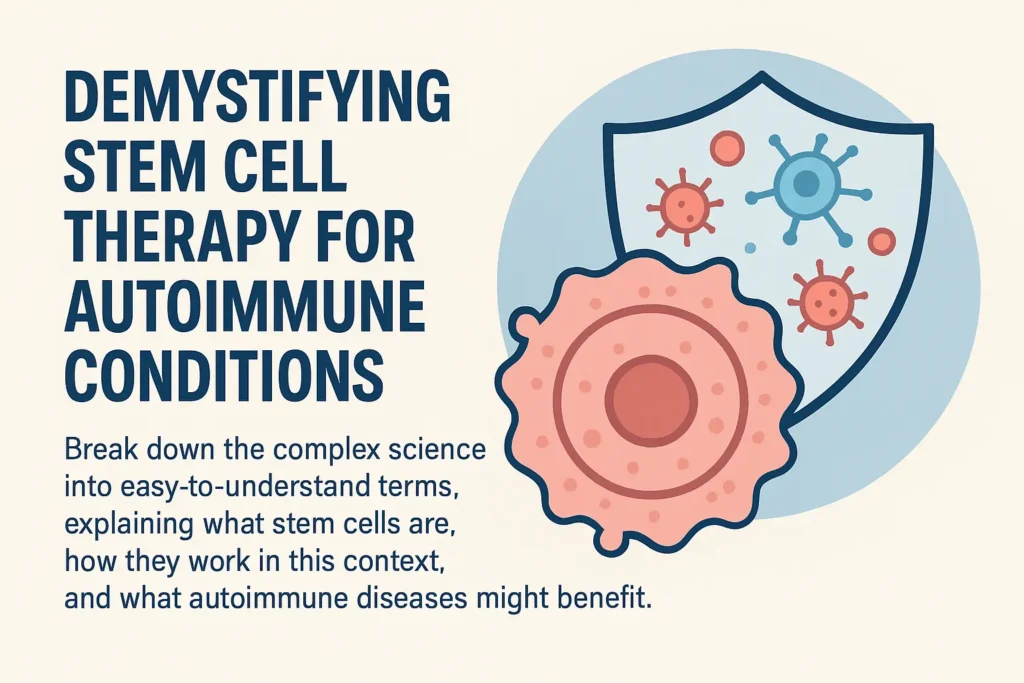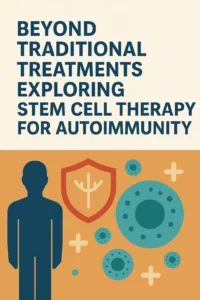Stem Cell Therapy Autoimmune: A Powerful Breakthrough in Autoimmune Disease Treatment
Living with an autoimmune condition can feel like a never-ending battle. If you’re seeking new treatment options for autoimmune diseases, you may have come across the promising field of stem cell therapy autoimmune. But what is it really? And how could it help manage your condition?
In this article, we’ll break down the science of stem cell treatment for autoimmune diseases, explain how it works, and highlight which conditions could benefit from this innovative therapy.
What Is Stem Cell Therapy for Autoimmune Disease?
To understand stem cell therapy autoimmune, let’s start with the basics. Stem cells are the body’s raw materials cells that can develop into many different types of cells, including immune cells. They can also repair or replace damaged tissues.
In the context of autoimmune diseases, the immune system mistakenly attacks healthy tissues. This leads to chronic inflammation, pain, and a range of debilitating symptoms. The goal of stem cell therapy is to “reset” the immune system using healthy, regenerative stem cells.
So, what is stem cell therapy for autoimmune disease? It involves harvesting stem cells from your own body (often from bone marrow or fat tissue), or from a donor, and then infusing them into your body after suppressing the malfunctioning immune system. These new cells aim to rebuild a balanced immune response potentially reducing or eliminating autoimmune activity.
How Does Stem Cell Therapy Work in Autoimmune Conditions?
Stem cell therapy for autoimmune treatment follows a multi-step process:
- Collection: Stem cells are harvested from your body or a donor.
- Conditioning: High-dose chemotherapy or immunosuppressive drugs are used to “wipe out” the faulty immune system.
- Infusion: Healthy stem cells are reintroduced into the bloodstream.
- Regeneration: Over time, these stem cells form a new, more balanced immune system.
This process may help reduce or eliminate the faulty immune responses that drive autoimmune diseases. This approach is sometimes called hematopoietic stem cell transplantation (HSCT) or mesenchymal stem cell therapy, depending on the type of cells used.
Which Autoimmune Diseases Might Benefit?
While research is still ongoing, stem cell therapy autoimmune research has shown promising results for several conditions:
1. Multiple Sclerosis (MS)
HSCT has shown potential in reducing relapses and slowing progression in MS patients.
2. Rheumatoid Arthritis (RA)
Preliminary studies show that stem cell infusions can reduce inflammation and joint damage.
3. Lupus (Systemic Lupus Erythematosus)
Some patients have entered long-term remission following stem cell treatment.
4. Type 1 Diabetes
Stem cell therapy aims to regenerate insulin-producing cells and reduce autoimmune attacks on the pancreas.
5. Crohn’s Disease
Stem cell therapy may help regenerate damaged gut tissue and reduce inflammation.
Each disease responds differently, and stem cell treatment for autoimmune explained is still an evolving science but the results so far are encouraging.
Benefits of Stem Cell Therapy for Autoimmune Diseases
- Immune System Reset: A chance to rebuild a healthier immune system from scratch.
- Reduced Dependence on Medications: Some patients experience long-term relief and require fewer drugs.
- Fewer Flare-Ups: A more regulated immune system may reduce the frequency and intensity of symptoms.
- Improved Quality of Life: Many patients report feeling better overall, with less fatigue and more mobility.
Risks and Considerations
Although the potential is exciting, it’s important to approach stem cell therapy autoimmune treatment with realistic expectations:
- Risks of Chemotherapy: The conditioning phase can be intense, with side effects like nausea, infection risk, and fatigue.
- Rejection or Graft-Versus-Host Disease: In donor-based treatments, the body may reject the new cells.
- High Costs and Limited Access: Many procedures are still in clinical trials or not widely available.
- Long-Term Effects Unknown: More research is needed to fully understand long-term benefits and risks.
Consulting with a specialist and considering enrolling in a clinical trial may be the best way forward for many patients.
Is Stem Cell Therapy FDA Approved?
Currently, stem cell therapy for autoimmune diseases is still considered experimental in most countries. The FDA has approved certain types of stem cell procedures, particularly for blood cancers, but most autoimmune treatments are still under investigation.
That said, the autoimmune disease new treatments pipeline is rich with ongoing clinical trials and new research, showing serious momentum toward broader approval.
How to Access Stem Cell Therapy for Autoimmune Diseases
If you’re interested in exploring this therapy:
- Speak with a Rheumatologist or Neurologist: They can guide you based on your condition.
- Research Clinical Trials: Websites like ClinicalTrials.gov list trials accepting patients.
- Choose Accredited Centers: Always opt for certified and reputable medical institutions offering experimental therapies.
- Understand the Cost: Ask about financial assistance, insurance coverage, or clinical trial funding.
Conclusion: Stem Cell Therapy Autoimmune Offers Real Hope With Caution
Stem cell therapy autoimmune treatment is emerging as one of the most promising autoimmune disease new treatments available today. While it’s not a magic bullet, the science behind it is advancing quickly and for some patients, it’s already changing lives.
If you’re living with an autoimmune condition and looking for new ways to manage it, stem cell therapy might be worth exploring under medical guidance. Keep informed, ask questions, and be proactive in your healthcare journey.





